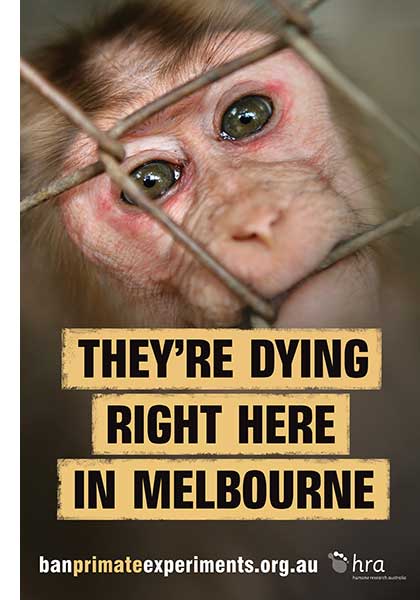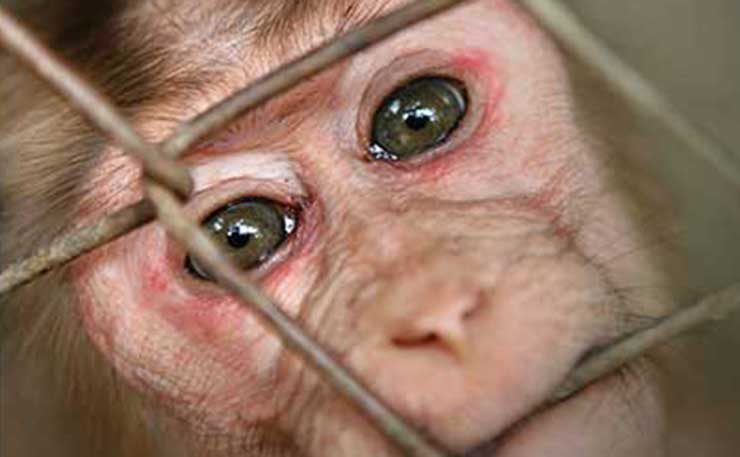Animal rights group Humane Research Australia has launched a new push to put medical research which uses primates as subjects on the agenda, scraping together the funds for a billboard in a busy Melbourne intersection through donations from its roughly 500 members.
Helen Marston is the Chief Executive Officer of the group, and she says that despite years of campaigning, most Australians don’t know that their tax dollars are used to fund research which sees primates like macaques, marmosets and baboons “put in a chair, their head held in place, and screws going into their skull”.According to the latest data from 2013, Marston said, there was a total of 219 animals used in research in Australia during that year alone, “but quite often some of these studies that involve primates are long-term so they could be used for several years”.
“People usually do not have much idea that we use primates in experiments in Australia; quite often we’re at expos or presentations and we talk to people about these things and their response is ‘that doesn’t happen here,’” Marston said.
“People think of animal experiments of years ago — with monkeys with electrodes going into their brains — but that’s exactly what’s happening now.”
The billboard has been installed at a busy intersection on Punt Road, in the Melbourne suburb of Richmond, and Marston said that she hopes it will boost Humane Research Australia’s campaign to raise awareness of the hundreds of animals used in invasive experiments each year.

“Unless everybody knows this is happening in Australia then we can’t really argue against it, because nobody knows what’s going on,” she said.
According to Humane Research Australia, over the last 12 months, the taxpayer-funded National Health and Medical Research Council has awarded 14 grants for nearly $10 million to universities, including the Australian National University, Monash, Melbourne University, the University of Queensland and Sydney University.
The National Health and Medical Research Council also funds breeding facilities around the country, and Humane Research Australia said that in addition at least 688 primates have been imported into Australia between 2000 and 2014.
“[While] there is a code of practice that [researchers]have to adhere to, and it has to go through an animal ethics committee, we believe that those processes are not effective. The whole industry is self regulated,” Marston said.
She said the most invasive experiments were done on monkey’s brains and eyes, that researchers induce strokes, heart attacks, illnesses similar to HIV aids, cut out primate’s eyes while they’re still alive, and that people were being left in the dark because “the whole industry is so well hidden”.
“It’s really, really difficult to get information about any of these experiments,” Marston said.
“We try to make contact with the breeding facilities — they won’t liaise with us or respond to our requests.”
New Matilda has approached the National Health and Medical Research Council for comment. We have asked whether, in this day and age, primates are still necessary for medical research, and what the Council’s view on a growing chorus of claims that the data is not particularly accurate are.
“There have been what’s called systematic reviews done,” according to Marston, “and they have found that research which uses primates as subjects is not very well predictive of human outcomes”.
“Even though we’re similar in our genetics, there are so many subtle differences and you cannot translate the data and expect it to work the same way,” she said.
Humane Research Australia has started a petition calling for an end to research on primates and sanctuaries for animals currently housed in breeding and research facilities. It’s available on their site, which you can visit here.
* New Matilda relies almost entirely on reader subscriptions for its survival. If this sort of reporting is important to you, please consider supporting us by donating here, or subscribing here.
Donate To New Matilda
New Matilda is a small, independent media outlet. We survive through reader contributions, and never losing a lawsuit. If you got something from this article, giving something back helps us to continue speaking truth to power. Every little bit counts.





